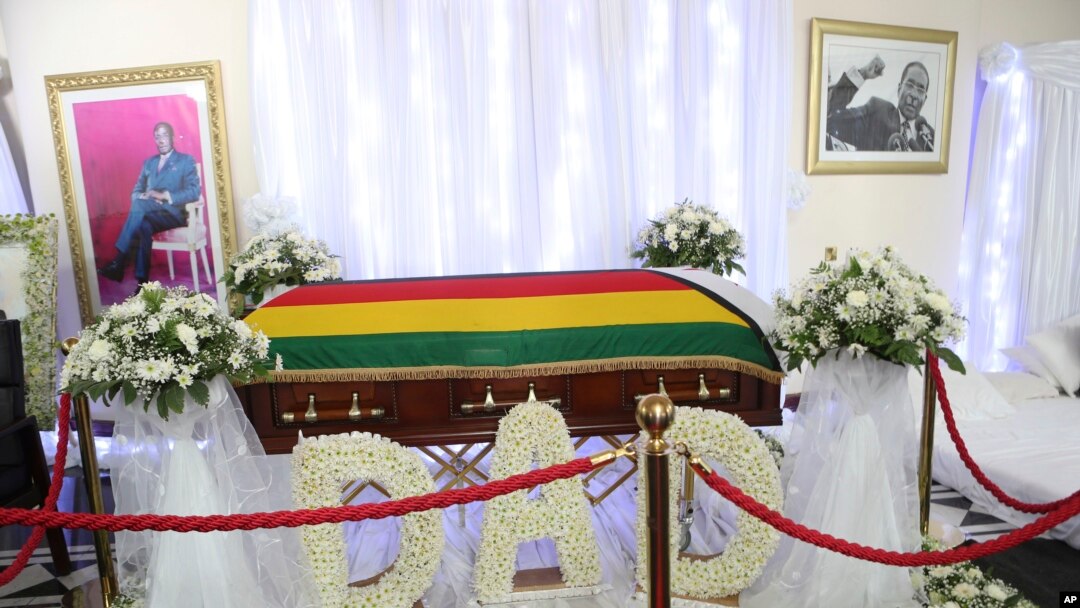Zimbabwe's president and the family of former president Robert Mugabe are in discussions Thursday to decide where the deceased leader will be buried.
President Emmerson Mnangagwa came to Mugabe's home and said he will consult with the ex-president's widow, Grace, and other family members over the controversial issue of the burial place.
"We have no idea where we will bury him yet," said Mnangagwa at the Mugabe family home. "We need to talk to Amai [Mrs. Mugabe] and the family first."
Mnangagwa said he has asked for "a one-on-one" meeting with Grace "to discuss some issues."
"We had let bygones be bygones. You [Mrs. Mugabe] have the full support of the government. Nothing will change," said Mnangagwa, adding that his government will respect the family's wishes.
Mnangagwa spoke from inside the mansion and his comments were broadcast to press outside the house. Mnangagwa and the family then began private talks.
The ongoing uncertainty of where Mugabe, who died last week at the age of 95, will be buried has overshadowed the arrangements for Zimbabweans to pay their respects to the former guerrilla leader at several historic sites.
The dispute over the burial has sparked speculation of a bitter disagreement between the government and Mugabe's wife and other family members.
The government had earlier stated that Mugabe would be buried at the Heroes' Acre state monument, a burial place reserved for top officials of Zimbabwe's ruling ZANU-PF party who contributed to ending white colonial rule. But some family members said he should be buried at his birthplace, according to Zimbabwean tradition.
It had long been expected that Mugabe would be buried at Heroes' Acre, a monumental burial location atop a prominent hill featuring a grandiose towering sculpture of guerrilla fighters that Mugabe built with help from North Korea. Mugabe's first wife, Sally, is buried there next to a gravesite long reserved for the ex-leader.
Mugabe died last week in a hospital in Singapore and his body was flown back to Zimbabwe, the southern African country which he fought to free from white-minority rule and then ruled from its independence in 1980 until 2017 when he was deposed by the military and Mnangagwa.
Earlier Thursday at Blue Roof, Mugabe's 25-bedroom mansion in Harare's posh Borrowdale suburb, Zimbabwe's opposition leader paid his respects to the man who had been his bitter political foe.
"I am here to do the African thing that is expected ... to pay honor," said Nelson Chamisa, leader of the Movement for Democratic Change, the main opposition party.
"In politics we have had many differences but we are here to reflect on his contribution. ... We are here to pay condolences to the Mugabe family, all Zimbabweans and indeed the whole of Africa. It is only fair and necessary to see that we unite to see that he is given a decent burial and a peaceful send off. Today is a day of mourning."
As mourners sang songs of bereavement in front of the Mugabe mansion, leaders of Zimbabwe's military arrived to pay their respects to Mugabe and his widow, Grace
Later Thursday the casket is to be taken to Rufaro Stadium in Harare's poor Mbare neighborhood and then to Zvimba, Mugabe's birthplace 85 kilometers (55 miles) northwest of the capital, where it is expected to stay overnight.
On Friday the casket is to go back to Rufaro stadium and on Saturday a ceremony will be held at the National Sports Stadium, which African heads of state and other prominent officials are expected to attend. Supporters of the ruling ZANU-PF party are being bused from all over the country to go to the stadium ceremonies.
Grace Mugabe is expected to stay beside the casket the entire time.
Shortly after Mugabe's death, nephew Leo Mugabe said the former strongman died ``a very bitter man'' because he felt betrayed by Mnangagwa and the army generals who were his allies for close to four decades before they put him under house arrest and forced him to resign.
However on Wednesday Leo Mugabe told The Associated Press on Wednesday that relations are good between the family and Mnangagwa.


